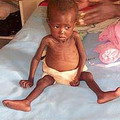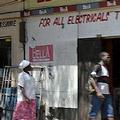 在辛巴威的南馬塔貝萊蘭省(Matabeleland South Province),每年不到450豪米的降雨量,只能勉強供給居民賴以維生的食物生長。辛巴威這些南邊省份的地理環境適合放牧牛羊,卻貧瘠到極不利農作。
在辛巴威的南馬塔貝萊蘭省(Matabeleland South Province),每年不到450豪米的降雨量,只能勉強供給居民賴以維生的食物生長。辛巴威這些南邊省份的地理環境適合放牧牛羊,卻貧瘠到極不利農作。
每日清晨,村民們在這塊乾燥荒地蒐刮任何野生生物和野果,不無絕望地去嘗試尋找食物。
村民生存的希望全維繫在散佈於荒地中的巨大波巴布樹(baobab tree,俗稱猢猻木、猴麵包樹或酸瓠樹)上,他們將其果實搗碎取出裹在種子外的白粉,混以生乳後成塔塔醬狀就是一頓晚餐,而生乳通常只能以水取代。人多果少,取盡後村民們就將猢猻木樹根搗糊(當地人稱為amagontsi或umtopi),以為充饑主食。
在辛巴威長期的經濟和政治危機中,鄉下居民挨餓的景況因為食物短缺和糧價飆漲而持續惡化。
根據聯合國世界糧食計劃署(The World Food Programme,WFP)的最新統計,至2008年10月估計約510萬辛巴威人需要糧食救助。
現在南馬塔貝萊蘭省關達鎮(Gwanda)的饑民們還是只能倚賴猢猻木果實和樹根維生,因為辛巴威國家穀物行銷委員會(Grain Marketing Board,GMB)原本擁有來自南非的主要作物補給,被執政黨「非洲民族聯盟—愛國陣線」(ZANU-PF party)從中攔截轉售給龐大的黑市,使饑民們無法向GMB購買玉米。
黑市玉米就在辛巴威國家穀物行銷委員會的倉庫外,明目張膽擺攤,一袋20公斤就要價40辛幣,然而大部份的居民每月還賺不到一半。群聚在小金礦場工作的大多數居民,因為辛巴威持續惡化的經濟危機,正身陷地獄般的處境。
雖然這些飢荒地區的村民代表能從在辛巴威國家穀物行銷委員會,得到一些糧食轉賣給居民們,但是據報導,執政黨ZANU-PF party未連任的前村民代表也有辦法取得GMB的糧食來轉售。
反對黨「民主變革運動」(Movement for Democratic Change)以穆坦巴拉(Arthur Mutambara)為首之派系的區域秘書長穆克維納(Petros Mukwena)表示,上週就有一個ZANU-PF黨的前村民代表取走200袋糧食,分給地方黨員每人10袋。
前GMD會長Gasela也大嘆,因為官商勾結和執政黨政客中飽私囊而造成糧荒,實在很荒謬。 
同時MDC最大派系領袖茨萬吉拉伊(Morgan Tsvangirai)表示,MDC十分關注辛巴威鄉村嚴重的饑荒問題,他本人正積極與辛國總統穆加比(Mugabe)協商平權交易,遺憾的是目前仍未有任何協議達成的跡象。
他也極力拉攏南非總統姆貝基(Thabo Mbeki)幫忙說服穆加比,讓人道救援機構重新協助上百萬的饑民。辛巴威政府在2008年6月禁止這些機構配給糧食。
Matabeleland South receives less than 450 millimeters of rainfall per year. At best, it produces just enough food for its people to survive. The southern provinces, while good for livestock rearing, are not suitable for agriculture.
At dawn each day, the villagers of this dry and dusty region comb the hinterlands in search of any wildlife or edible wild fruits, in a desperate attempt to put food on the table.
The giant baobab trees that dot the terrain have become about the only source of sustenance. The villagers go first for the fruit, the seeds of which are coated in a white powder which separates from the pips when pounded in a mortar. Mixed with fresh milk, the powder produces a kind of cream of tartar. People here have this for dinner, although most mix the powder with water instead. But as the baobab fruit is finished quickly, villagers then go for the roots, which are pounded into a porridge-like paste - known in local languages as amagontsi or umtopi - which serves as their main meal.
As Zimbabwe's economic and political crisis continues, rural areas of the country have been worst hit by severe food shortages and escalating prices.
According to recent statistics from the United Nations World Food Programme, about 5.1 million Zimbabweans will be queuing up for food handouts by October this year.
In Gwanda town, hungry residents who have not been given an opportunity to buy maize from the Grain Marketing Board are also resorting to eating porridge prepared from baobab fruits or ground roots. They say that officials from President Robert Mugabe's ruling ZANU-PF party quickly snap up the little grain that is delivered to the GMB's main depot from South Africa and channel it into the thriving black market.
Just outside the Grain Marketing Board depot, vendors could be seen selling a 20 kg bag of maize meal for 40 Zimbabwe dollars. This is out of the reach of most residents, very few of whom earn more than 20 ZWD a month. Most locals are employed at surrounding small-scale gold mines, which are currently in limbo because of the country's ongoing economic crisis.
In rural parts, councillors are allowed to collect grain from the Grain Marketing Board, which is then sold to villagers in their respective wards. But according to reports, ZANU-PF former councillors who lost their seats are still allowed to take advantage of this arrangement, collecting grain from the Grain Marketing Board and selling it on.
"Last week, a former ZANU-PF councillor from Enyandeni collected 200 bags from the Grain Marketing Board and gave 10 bags to each [ZANU-PF] official in the area for their own consumption," said Petros Mukwena, the provincial secretary for the Arthur Mutambara-led faction of the opposition Movement for Democratic Change, MDC.
According to Gasela, there is no good reason for the ongoing food shortages.
Leader of the main MDC faction Morgan Tsvangirai said the situation in rural areas throughout the country is a cause of great concern for him and his party. While Tsvangirai has been in negotiations with Mugabe to reach a power-sharing deal, there is little sign that the men are close to an agreement.
The MDC leader appealed to the mediator in the talks, South African president Thabo Mbeki, to persuade Mugabe to allow humanitarian agencies to resume their work, as millions of Zimbabweans face starvation. The agencies were banned from distributing food in June this year.
{This article originally appeared in Zimbabwe Crisis Reports, produced by the Institute for War and Peace Reporting. }
全文及圖片詳見:ENS





